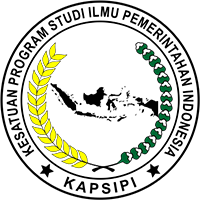Digital Government in Handling Corona Virus Disease 2019 (COVID-19) in Pekanbaru City
DOI:
https://doi.org/10.35967/njip.v22i1.457Keywords:
Transformation Government, Digital Government, Handling COVID 19, Pandemi COVID 19Abstract
The global crisis of the COVID-19 pandemic has completely changed all aspects of people's lives. Digital is the new normal and the pandemic has emphasized the link between digitalization and development. Adaptive risk management can also be seen from the use of technology and information by the government through the relevant Ministries launched various applications that aims to make the handling of COVID-19 more effective, especially in health services and tracking and tracing as well as providing information. This paper is based on the research results using qualitative methods with exploratory analysis. There are three approaches in looking at digital governance strategy, namely the information systems strategy approach through a master plan for the field of information systems, alignment of information system functions and their application to achieve the organization's mission, and development of a shared vision of what the organization can achieve. Pekanbaru City Government in 2020 follows up on policies related to digital-based handling of COVID-19 governance by issuing several applications and handling information systems COVID 19 is like PPC 19, Waspada COVID 19, Data Rumah and Vaksin COVID 19.
Downloads
References
Aasback, A. W., & Rokkum, N. H. A. (2021). Domesticating Technology in Pandemic Social Work. Journal of Comparative Social Work, 16(2), 172–196. https://doi.org/10.31265/JCSW.V16I2.387
Amin, R. M., Febrina, R., & Wicaksono, B. (2021). Handling COVID-19 from a Collaborative Governance Perspective in Pekanbaru City. Jurnal Bina Praja, 13, 1–13. https://doi.org/10.21787/jbp.13.2021.1-13
Amin, R. M., Febrina, R., & Wicaksono, B. (2022). Model Proses Penanganan COVID-19 dalam Perspektif Multi-Stakeholder Partnership. Jurnal Ilmu Sosial Dan Humaniora, 11(1), 111–125. https://doi.org/10.23887/jish.v11i1.39418
Falk, S., Römmele, A., & Silverman, M. (2016). Digital Government, Leveraging Innovation to Improve Public Sector Performance and Outcomes for Citizens. In Digital Government: Leveraging Innovation to Improve Public Sector Performance and Outcomes for Citizens. https://doi.org/10.1007/978-3-319-38795-6
Gil-Garcia, J. R., & Flores-Zúñiga, M. (2020). Towards a comprehensive understanding of digital government success: Integrating implementation and adoption factors. Government Information Quarterly, 37(4), 101518. https://doi.org/10.1016/j.giq.2020.101518
Kontogeorgis, G., & Varotsis, N. (2021). Reinstating greek e-governance: A framework for e-government benchmarking, improvement and government policies. Public Administration Issues, 6(Ii), 103–127. https://doi.org/10.17323/1999-5431-2021-0-6-103-127
Kuziemski, M., & Misuraca, G. (2020). AI governance in the public sector: Three tales from the frontiers of automated decision-making in democratic settings. Telecommunications Policy, 44(6). https://doi.org/10.1016/j.telpol.2020.101976
Moleong, L. J. (2007). Metodologi Penelitian Kualitatif. PT Remaja Rosdakarya Offset.
Mudjiyanto, B. (2018). Tipe Penelitian Eksploratif Komunikasi. Jurnal Studi Komunikasi Dan Media, 22(1), 65. https://doi.org/10.31445/jskm.2018.220105
Nations, U. (2021). Compendium of Digital Government Initiatives in Response to the COVID-19 Pandemic: 2020. In Compendium of Digital Government Initiatives in Response to the COVID-19 Pandemic: 2020. https://doi.org/10.18356/9789210053709
Pirmanto, D. (2016). Jenis Penelitian Menurut Kedalaman analisis data. Journal of the American Chemical Society, 77(21), 13. http://staffnew.uny.ac.id/upload/132232818/pendidikan/Analisis+Kuantitatif.pdf
Puron-Cid, G., Luna, D. E., Picazo-Vela, S., Gil-Garcia, J. R., Sandoval-Almazan, R., & Luna-Reyes, L. F. (2021). Improving the assessment of digital services in government websites: Evidence from the Mexican State government portals ranking. Government Information Quarterly, September 2019. https://doi.org/10.1016/j.giq.2021.101589
Sandoval Almazan, R., Luna-Reyes, L., Luna, D., Gil-Garcia, J. R., Puron-Cid, G., & Picazo-Vela, S. (2017). Building Digital Government Strategies. https://doi.org/10.1007/978-3-319-60348-3
Shava, E., & Vyas-Doorgapersad, S. (2022). Fostering digital innovations to accelerate service delivery in South African Local Government. International Journal of Research in Business and Social Science (2147- 4478), 11(2), 83–91. https://doi.org/10.20525/ijrbs.v11i2.1610
Tangi, L., Janssen, M., Benedetti, M., & Noci, G. (2021). Digital government transformation: A structural equation modelling analysis of driving and impeding factors. International Journal of Information Management, 60(April), 102356. https://doi.org/10.1016/j.ijinfomgt.2021.102356
Wahanisa, R., Mukminto, E., Damayanti, R., & Muhtada, D. (2021). The Utilization of E-Government Public Service for Improving Public Capability and Accessibility During the Covid-19 Pandemic. Proceedings of the International Conference on Environmental and Energy Policy (ICEEP 2021), 583(Iceep), 184–187. https://doi.org/10.2991/assehr.k.211014.039
Downloads
Published
How to Cite
Issue
Section
License
Copyright (c) 2023 Authos(s)

This work is licensed under a Creative Commons Attribution-NonCommercial-ShareAlike 4.0 International License.





